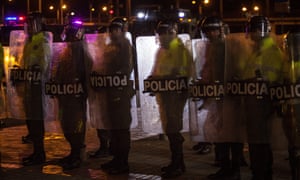Border closures, curfews and bans on sale of alcohol announced as tens of thousands are expected to march amid wave of turmoil
Colombia’s government has announced plans to close its borders, part of a string of measures to contain mass strikes and protests planned this week amid sweeping unrest in South America.The marches, announced weeks ago following proposed austerity measures, come amid a wave of political turmoil across the region: Chile has seen more than a month of anti-government protests, which last week led its political parties to agree to a referendum on replacing the country’s dictatorship-era constitution; Bolivia is still reeling from the military-backed ousting of the president, Evo Morales. Colombia’s neighbours are also mired in political turbulence: Ecuador’s president, Lenín Moreno, was forced to backtrack on austerity measuresby a wave of popular protest, while Venezuela is still mired in economic collapse and political violence.
Duque’s government is clearly nervous. On Monday, his government authorized a number of riot-control measures ahead, allowing local authorities to impose curfews and ban the sale of alcohol. Colombia’s borders will also be closed until Friday morning, it was later announced.
In the capital, Bogotá, squadrons of riot police could be seen outside a number of universities. Many businesses will close while schools have instructed staff and students to stay home.
On Tuesday, police searched 27 homes of people thought to be involved in the protests.
“The government is worried because the people and organizations who have come out in support of the protest are more heterogeneous than they are used to,” said Sergio Guzmán, the director of Colombia Risk Analysis. “It’s not only the labour unions, or the students, or indigenous people; it’s all of them.”
The protests were called in response to a range of issues and follow a spate of occasionally violent student demonstrations in September.
Some marchers will be protesting against the government’s perceived slow-walking of a peace deal with leftist rebel group the Revolutionary Armed Forces of Colombia (or Farc). Others are incensed by the routine murders of indigenous leaders and local activists. And others are unimpressed with government malaise and corruption.
Nancy Patricia Gutiérrez, the interior minister, told journalists on Monday that some of the motives for the strike were “false”.
After decades of civil conflict, Colombia has recently been among the more stable countries in Latin America. Protests often fail to attract large numbers, which activists attribute to a fear of being demonized as hardline leftists or rebel sympathizers. That stigma looks to be lifting ahead of Thursday.
“I’m marching because I’m one of those Colombians who isn’t afraid,” said María Paula Hernández, an audiovisual producer who is organizing a group of colleagues to protest in Bogotá. “I’m marching because I stand against this government.”


No comments:
Post a Comment